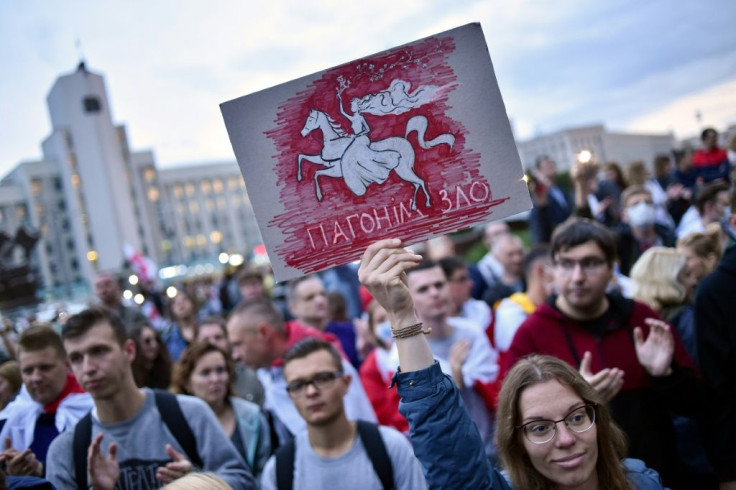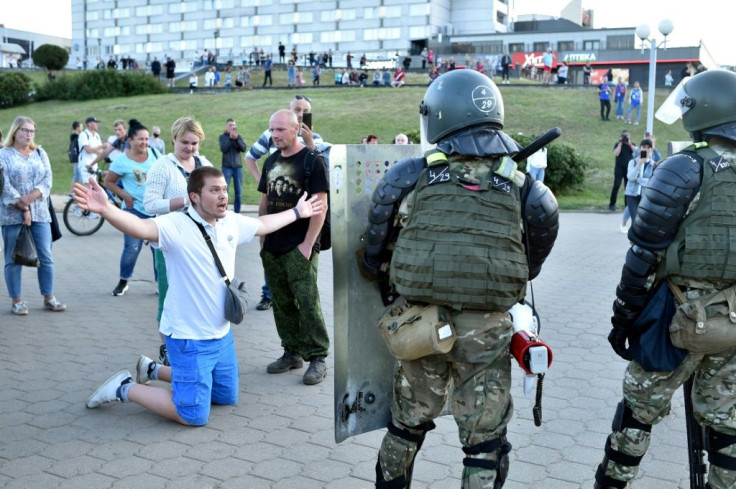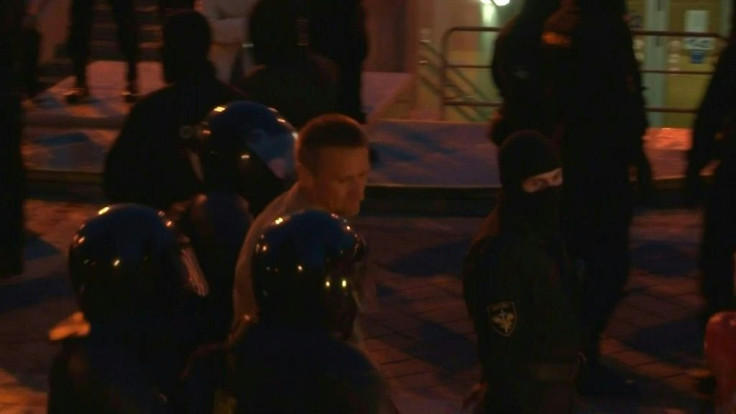Putin Vows Military Support For Belarus' Lukashenko
Russian President Vladimir Putin vowed military support for embattled Belarusian leader Alexander Lukashenko on Thursday, while urging a peaceful resolution to unrest and demonstrations that erupted after a disputed election.
After the August 9 presidential poll, Lukashenko claimed a landslide reelection with some 80 percent of the vote.
The 65-year-old Belarusian strongman's relationship with Putin had soured ahead of the ballot because Minsk refused closer integration with Russia -- and even claimed Moscow had sent mercenaries across the border to organise riots.
Yet Putin on Thursday promised military backing for Belarus and said Russia had set up a reserve group of law enforcement officers to deploy if the post-vote situation deteriorated.

"It won't be used unless the situation starts to get out of control," Putin said, unless "extremist elements ... begin setting fire to cars, houses and banks, begin seizing administrative buildings".
NATO chief Jens Stoltenberg said Russia should stay out of the crisis saying it was a "sovereign and independent state."
Polish Prime Minister Mateusz Morawiecki meanwhile said any Russian intervention would be a breach of international law and the "human rights of Belarusian people, who should be free to decide their own fate".
But Putin also called on the authorities in Minsk and the opposition to "find a way out" of the crisis peacefully.

He conceded there were problems in Belarus, saying, "otherwise people wouldn't take to the streets".
The Russian leader's calls for calm came after the European Union and ambassadors of member states in Minsk condemned a crackdown on government critics seeking new elections and Lukashenko's resignation.

The opposition created a Coordination Council to oversee the peaceful transition of power after their leader Svetlana Tikhanovskaya fled to neighbouring Lithuania fearing reprisals.
Lukashenko ordered a criminal probe into the opposition's attempts to "seize power" and several of the presidium's members have been detained or summoned for questioning.
Nobel Prize-winning author Svetlana Alexievich and Tikhanovskaya aide Maria Kolesnikova were questioned on Wednesday and Thursday, but said they refused to answer.
Two other presidium members were this week sentenced to 10 days each in police detention for organising unsanctioned rallies and disobeying law enforcement orders.

And on Thursday, around 20 Belarusian and foreign journalists were taken to a police station for "identity checks" -- just as they were preparing to cover a new demonstration.
Around 70 people were later arrested as police broke up the protest, according to the Viasna Human Rights Centre.
"The European diplomats emphasised that prosecution of Coordination Council members on grounds presented by the authorities is unacceptable," a joint statement said.
EU nations have also vowed to sanction individuals they say were involved in vote-rigging and the violent crackdown on protesters.
The EU ambassadors in Minsk on Thursday said that: "Belarusians are asking for an open dialogue with their own authorities about the future of their country," urging "a peaceful and democratic process, underpinned by independent and free media and a strong civil society".
The presidium on Thursday said the formation of armed groups abroad to intervene in Belarus was "unacceptable" and against the wishes of the Belarusian people.
Lukashenko has dismissed calls to resign or hold new elections, instead accusing Western countries and Russia of stirring political unrest.
The authoritarian leader on Thursday said the ex-Soviet country's European neighbours had declared a "diplomatic war" and were meddling in Belarus's internal affairs.
Last week he described demonstrators as "rats" in a video that showed him carrying an assault rifle, after more than 100,000 people took to the streets to demand he stand down.
His notorious security services rounded up nearly 7,000 participants in peaceful rallies that erupted in the days after the vote, and hundreds of detainees claimed they were abused by police in custody.
Local and international rights groups have urged the UN to investigate allegations of systematic torture at the hands of security services.
Tikhanovskaya, a 37-year-old political newcomer who ran in place of her jailed husband, called for historic demonstrations and mass strikes following the election.
Industry Minister Pyotr Parkhomchik said Thursday that there were no ongoing strikes and that "all assembly lines have been restarted."
© Copyright AFP 2024. All rights reserved.





















